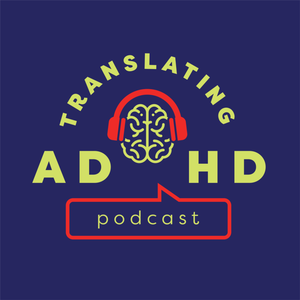
Translating ADHD
Cameron Gott, Shelly Collins
- 27 minutes 43 secondsSex, Sensitivity, and Self-Discovery: The ADHD Experience
In this episode, hosts Ash and Dusty explore the complex relationship between ADHD and sexuality, discussing how attention challenges can impact intimacy and arousal. Dusty highlights the disconnect many individuals with ADHD may feel towards their bodies, illustrating how hyper-focusing on daily tasks can overshadow the awareness of physical desires. The conversation touches on the societal pressures faced by women and the emotional labor involved in sexual relationships, as well as the unique experiences of trans individuals navigating their identities and desires.
As the discussion unfolds, the hosts share personal insights on rejection sensitivity and the importance of boundaries in intimate relationships. They emphasize the necessity of communication and intentionality in sexual encounters, arguing that scheduling can serve as a practical tool for both arousal and life balance. Together, they set the stage for a follow-up episode that will delve deeper into building a fulfilling sex life while managing ADHD and other personal challenges.
Episode links + resources:
For more of the Translating ADHD podcast:- Episode Transcripts: visit TranslatingADHD.com and click on the episode
- Follow us on Twitter: @TranslatingADHD
- Visit the Website: TranslatingADHD.com
20 January 2025, 10:00 am - 31 minutes 22 secondsEmbracing the Clean Slate: Navigating ADHD in the New Year
In this episode, hosts Ash and Dusty explore the challenges and opportunities that the New Year presents for individuals with ADHD. They delve into the concept of clean slate thinking and how it can be both a trap and a motivational tool. While traditional New Year's resolutions can often feel overwhelming due to heightened expectations, Ash shares a personal practice of choosing a word to guide intentions throughout the year. This approach helps in maintaining focus and aligning actions with personal values, without the pressure of strict resolutions.
The conversation shifts to the difficulties of maintaining routines amidst disruptions, such as holidays or life changes, and how these disruptions can significantly impact those with ADHD. Dusty introduces the idea of an "11-month year," allowing January to serve as an adjustment period rather than a time for rigorous goal-setting. Both hosts emphasize the importance of curiosity, awareness, and non-judgment in managing routines and personal goals. They encourage listeners to find humor and joy in setting unique, personal intentions that align with what truly matters to them, rather than succumbing to societal pressures of productivity.
Episode links + resources:
For more of the Translating ADHD podcast:- Episode Transcripts: visit TranslatingADHD.com and click on the episode
- Follow us on Twitter: @TranslatingADHD
- Visit the Website: TranslatingADHD.com
13 January 2025, 10:00 am - 31 minutes 4 secondsNavigating Life with ADHD: Practical Strategies and Systems
In this episode, Ash and Dusty continue their exploration of effective systems that help them manage their lives with ADHD. Dusty shares how implementing multiple overlapping systems has allowed her to better organize her time and prioritize quality moments with her child, emphasizing the importance of novelty in maintaining motivation. She discusses how creating a visual weekly schedule for her child has enhanced their planning and engagement in activities together. Ash contributes by highlighting the significance of finding win-win situations in parenting, sharing his experiences running errands with his teenager, which fosters connection and communication.
The conversation transitions to household management, where both hosts share their unique approaches to cleaning and organization. Dusty explains the importance of setting up a minimalistic environment to reduce clutter while Ash discusses his strategies for keeping track of infrequent tasks, such as scheduling appointments and maintaining home maintenance. They conclude by reflecting on the value of planning ahead and establishing routines that align with their personal preferences, showcasing how understanding oneself can lead to more effective systems in daily life.
Episode links + resources:
For more of the Translating ADHD podcast:- Episode Transcripts: visit TranslatingADHD.com and click on the episode
- Follow us on Twitter: @TranslatingADHD
- Visit the Website: TranslatingADHD.com
6 January 2025, 10:00 am - 39 minutes 28 secondsSimplifying Life: Insights on Organization and Social Connections with ADHD
In this episode, Asher and Dusty share their personal experiences with various organizational systems that help them manage their ADHD. They discuss the importance of having a clear calendaring system, as well as how they prioritize appointments over tasks to reduce notification fatigue. Both hosts emphasize the need for simple, effective methods that cater to their unique preferences, such as using Google Docs for task management and pre-deciding meals to streamline dinner preparation.
The conversation also explores the significance of maintaining social connections and how their approaches differ. Asher highlights the benefits of eliminating social media for more meaningful in-person interactions, while Dusty shares strategies for keeping friendships alive through regular activities. Together, they illustrate that finding the right systems is a dynamic process, encouraging listeners to embrace trial and error in their journey toward organization and fulfillment.
Episode links + resources:
For more of the Translating ADHD podcast:- Episode Transcripts: visit TranslatingADHD.com and click on the episode
- Follow us on Twitter: @TranslatingADHD
- Visit the Website: TranslatingADHD.com
23 December 2024, 10:00 am - 35 minutes 36 secondsEmpowering Neurodivergent Parenthood: ADHD and Pregnancy Challenges
In this episode, hosts Ash and Dusty discuss the unique challenges faced by individuals with ADHD during pregnancy. Dusty shares her expertise in pregnancy coaching, highlighting the importance of understanding how ADHD can impact the pregnancy experience. The conversation touches on various topics, including the emotional and practical aspects of managing ADHD symptoms during pregnancy, the lack of research surrounding ADHD and pregnancy, and the recent developments in guidelines for medication use. Dusty emphasizes the necessity of community and support for neurodivergent parents, advocating for greater awareness and resources to empower them during this significant life transition.
The discussion also explores the realities of postpartum life, including the heightened risks for postpartum mood disorders among individuals with ADHD. Ash reflects on his experiences, expressing how knowing about his ADHD could have altered his pregnancy journey. They wrap up by highlighting the importance of preparation, flexibility, and finding a supportive network to navigate the complexities of parenting with ADHD, ultimately aiming for a positive parenting experience rooted in understanding and empowerment.
Episode links + resources:- Join the Community | Become a Patron
- Our Process: Understand, Own, Translate.
- About Asher and Dusty
- Dusty's Website
For more of the Translating ADHD podcast:- Episode Transcripts: visit TranslatingADHD.com and click on the episode
- Follow us on Twitter: @TranslatingADHD
- Visit the Website: TranslatingADHD.com
16 December 2024, 10:00 am - 28 minutes 38 secondsNavigating Activism with ADHD: Embracing Capacity and Compassion
In this episode of the Translating ADHD Podcast, Ash and Dusty explore the complexities of activism, particularly for individuals with ADHD and other neurodivergent conditions. They discuss how all-or-nothing thinking can hinder meaningful engagement in social justice causes, leading to feelings of despair or burnout. The conversation emphasizes the importance of recognizing one’s capacity and the need for nuance in advocacy. Rather than adhering to strict standards of activism, Ash and Dusty encourage listeners to reflect on their strengths, resources, and personal values to find sustainable ways to contribute to causes that matter to them.
They share personal experiences that illustrate the struggle between wanting to make a difference and managing day-to-day life demands. The discussion highlights the significance of small contributions and the collective nature of activism, reassuring listeners that every effort counts, no matter how minor it may seem. Ultimately, the episode empowers individuals to embrace their unique journeys in advocacy without the pressure of perfection, reminding them that it's okay to take breaks and reassess priorities as life evolves.
Episode links + resources:
For more of the Translating ADHD podcast:- Episode Transcripts: visit TranslatingADHD.com and click on the episode
- Follow us on Twitter: @TranslatingADHD
- Visit the Website: TranslatingADHD.com
9 December 2024, 10:00 am - 30 minutes 26 secondsNavigating Emotional Turmoil: ADHD and Global Events
In this episode of Translating ADHD, Ash and Dusty discuss the emotional challenges faced by individuals with ADHD in the wake of significant global events, such as elections and social issues. They explore how these events can lead to increased emotional dysregulation, rumination, and a diminished capacity to attend to daily responsibilities. Through personal anecdotes and client experiences, they emphasize the importance of recognizing one's emotional state and adapting self-care strategies accordingly. The hosts advocate for checking out from overwhelming news cycles and focusing on manageable tasks to maintain mental well-being.
The conversation also highlights the importance of community support and connection during difficult times. Ash shares his mantra of "no dying" as a reminder to prioritize self-preservation, while Dusty introduces practical tips for breaking tasks down into smaller steps to combat feelings of overwhelm. As they wrap up, they affirm that it's okay to be where you are emotionally and that the struggle will eventually ease, allowing for greater engagement with the world around you.
Episode links + resources:
For more of the Translating ADHD podcast:- Episode Transcripts: visit TranslatingADHD.com and click on the episode
- Follow us on Twitter: @TranslatingADHD
- Visit the Website: TranslatingADHD.com
2 December 2024, 10:00 am - 37 minutes 23 secondsEmpowering Your Financial Journey: Tips for ADHD Minds
In this episode of Translating ADHD, Ash and Dusty continue exploring the complexities of managing finances as individuals with ADHD. They introduce the concept of "ADHD tax," which refers to the additional costs incurred due to challenges like procrastination, forgetfulness, or impulsivity. Through personal anecdotes, they highlight the importance of self-forgiveness and radical acceptance when faced with financial setbacks, such as unexpected expenses or late fees. The discussion emphasizes the need for effective strategies, including acknowledging one's unique relationship with money, understanding spending habits, and making peace with occasional mistakes.
The hosts also delve into practical solutions for improving financial management. They recommend tools to help users plan for future expenses and track their spending effectively. Additionally, they encourage listeners to consider gamifying debt repayment or seeking support through body doubling or daily money managers if needed. Ultimately, Ash and Dusty advocate for curiosity and self-compassion in navigating financial challenges, reminding listeners that it's about finding what works best for them in their unique financial journeys.
Episode links + resources:- Join the Community | Become a Patron
- Our Process: Understand, Own, Translate.
- About Asher and Dusty
- You Need a Budget (YNAB)
For more of the Translating ADHD podcast:- Episode Transcripts: visit TranslatingADHD.com and click on the episode
- Follow us on Twitter: @TranslatingADHD
- Visit the Website: TranslatingADHD.com
25 November 2024, 10:00 am - 27 minutes 32 secondsNavigating Finances with ADHD: Breaking Down Barriers
In this episode of Translating ADHD, Ash and Dusty explore the complex relationship between ADHD and financial management. They discuss the emotional weight of financial discussions, including feelings of guilt and shame that many clients experience. Drawing from their personal experiences, they highlight how upbringing and context can shape one's understanding of money, credit, and financial responsibility. Dusty shares her struggles with credit scores and impulsive spending, while Ash reflects on the importance of learning about finances from a young age.
The conversation delves into the impact of ADHD on prioritization and decision-making regarding wants versus needs. Both hosts emphasize the significance of seeking advice from trusted individuals to gain clarity in financial matters. They also touch on the ripple effects that financial decisions can have on other aspects of life, such as self-care and household management. With the acknowledgment that many individuals face similar challenges, the episode sets the stage for a follow-up discussion on actionable strategies for improving financial literacy and management for those with ADHD.
Episode links + resources:
For more of the Translating ADHD podcast:- Episode Transcripts: visit TranslatingADHD.com and click on the episode
- Follow us on Twitter: @TranslatingADHD
- Visit the Website: TranslatingADHD.com
18 November 2024, 10:00 am - 33 minutes 36 secondsNavigating the Gray Area of ADHD Medication
In this episode of Translating ADHD, hosts Ash and Dusty explore the complex relationship between ADHD coaching and medication. They emphasize the importance of coaches maintaining ethical boundaries while still acknowledging the role medication plays in many clients' lives. The discussion covers the nuances of medication experiences, including how individual responses can vary significantly and the need for self-advocacy when navigating treatment options. Both hosts share personal anecdotes to illustrate the impact of medication on their own lives and those of their clients, stressing that medication is not a one-size-fits-all solution.
The conversation also delves into common misconceptions about ADHD medication, addressing stigma and the societal pressures that often accompany discussions about treatment. Ash and Dusty highlight the importance of curiosity in coaching, encouraging clients to examine their experiences with medication thoughtfully. By fostering an open dialogue, they aim to empower listeners to approach their medication journey with a better understanding and a willingness to advocate for their own needs.
Episode links + resources:
For more of the Translating ADHD podcast:- Episode Transcripts: visit TranslatingADHD.com and click on the episode
- Follow us on Twitter: @TranslatingADHD
- Visit the Website: TranslatingADHD.com
11 November 2024, 10:00 am - 35 minutes 48 secondsCreativity Unlocked: Navigating ADHD Challenges
In this episode of Translating ADHD, Ash and Dusty explore the intricate relationship between ADHD and creativity. They discuss the unique challenges faced by creative individuals with ADHD, such as analysis paralysis, perfectionism, and the overwhelming number of ideas that can hinder progress. The conversation emphasizes the importance of creating a supportive environment and allowing oneself the freedom to be bored, as both can foster creative thought. By sharing personal experiences and strategies, the hosts encourage listeners to embrace their creative pursuits without the weight of expectations or perfectionism.
The episode also highlights the significance of self-acceptance in the creative process. Dusty shares her journey of overcoming imposter syndrome in music by recognizing her strengths as a rhythm guitarist, while Ash illustrates how redefining success through choice can empower clients to engage creatively. Ultimately, the hosts invite listeners to reassess their limiting beliefs about creativity and consider how everyday actions can be seen as creative expressions, urging them to "just touch the clay" in their own lives.
Episode links + resources:
For more of the Translating ADHD podcast:- Episode Transcripts: visit TranslatingADHD.com and click on the episode
- Follow us on Twitter: @TranslatingADHD
- Visit the Website: TranslatingADHD.com
4 November 2024, 10:00 am - More Episodes? Get the App
Your feedback is valuable to us. Should you encounter any bugs, glitches, lack of functionality or other problems, please email us on [email protected] or join Moon.FM Telegram Group where you can talk directly to the dev team who are happy to answer any queries.
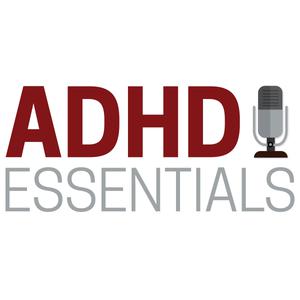 ADHD Essentials
ADHD Essentials
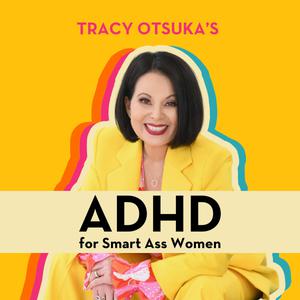 ADHD for Smart Ass Women with Tracy Otsuka
ADHD for Smart Ass Women with Tracy Otsuka
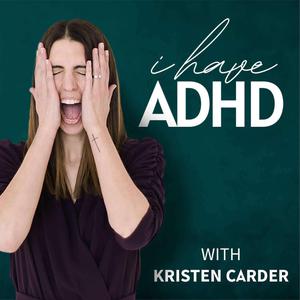 I Have ADHD Podcast
I Have ADHD Podcast
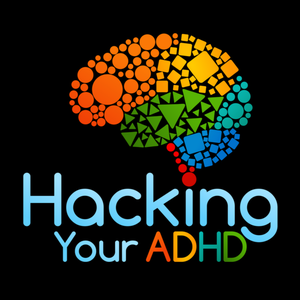 Hacking Your ADHD
Hacking Your ADHD
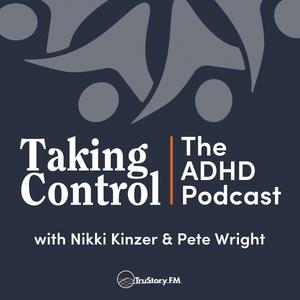 Taking Control: The ADHD Podcast
Taking Control: The ADHD Podcast
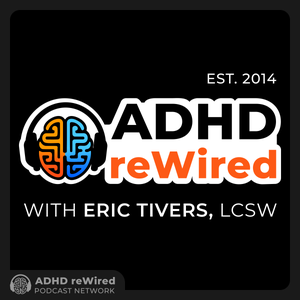 ADHD reWired
ADHD reWired